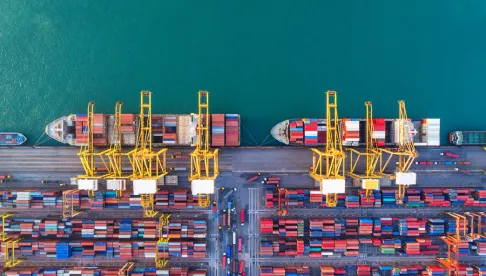Overview
On May 2, 2019, the Office of Foreign Assets Control (“OFAC”) announced an $871,837 settlement with MID-SHIP Group LLC (“MID-SHIP”), a New York shipbroker, for five apparent violations of the Weapons of Mass Destruction Proliferators Sanctions Regulations. The apparent violations occurred in 2011, when, as a result of agreements entered into by foreign subsidiaries, the company processed, through its U.S. offices and via U.S. financial institutions, payments worth $472,861 arising from charter agreements between non-U.S. parties for the carriage of steel coils between foreign ports, where the carriage was performed by vessels identified on OFAC’s List of Specially Designated Nationals and Blocked Persons (“SDN List”).
The settlement emphasizes vessel-related sanctions risks for parties in the shipping and logistics sector. (We discussed OFAC’s recent stern warnings to maritime supply chain actors, from shipping companies to charterers, to banks and insurers, and its articulation of specific compliance mechanisms for such actors here.) It also illustrates OFAC’s willingness to impose heavy penalties on companies for transactions involving the interests of sanctions targets, even when those targets are not direct counter‑parties. And the settlement once again illustrates the significant danger of failing to identify OFAC risk in a business portfolio and to implement an appropriate sanctions compliance program, backed by thorough-going management commitment, as set out in the Framework for OFAC Compliance Commitments that OFAC released on the same day as the MID-SHIP settlement.
* * * * *
Detail
As a shipbroker, MID-SHIP negotiated charter party agreements and earned commission payments for services including processing and facilitating payments from charterers to disponent owners and other brokers after a vessel had completed its voyage. In this case, MID‑SHIP’s subsidiaries in China and Turkey negotiated several third-party charter agreements, in February and April 2010, and the third parties to the agreements chose to have the goods carried on vessels – the M/V Haadi and the M/V Adrian – that were linked to Iranian companies or the Islamic Republic of Iran Shipping Lines (“IRISL”). MID-SHIP subsequently processed payments worth $472,861 between parties to the agreements (including commission payments to third-party brokers), and OFAC found that these payments, which were handled by internal accounting and other functions in the U.S. and processed through U.S. financial institutions, fell foul of the prohibition on dealing in property or interests in property of blocked parties.
At the time that MID-SHIP negotiated the charter agreements, neither vessel’s name appeared on the SDN List. However, the M/V Adrian had in fact been designated as an SDN in 2008, under the name “M/V Delight.” While the vessel name had changed after the designation, the 2008 designation provided the International Maritime Organization (“IMO”) number for the vessel and, in June 2010, OFAC had updated the SDN List with a note that the M/V Delight had changed its name to the M/V Adrian.
With respect to the M/V Haadi, the settlement acknowledged that the designation, which occurred in June 2010, post-dated the negotiation of the agreements. However, OFAC alleged that MID-SHIP knew or had reason to know that the vessels were subject to sanctions restrictions by the time, in 2011, that it processed the payments. OFAC based that determination on the facts that, by the time of the payments, both vessels were identified on the SDN List by name and IMO and MID-SHIP also possessed multiple documents that identified the vessels by their IMO numbers and connected the vessels to Iranian companies. These documents included a Lloyd’s Register Safety Management Certificate, a Lloyd’s Register International Ship Security Certificate, a Lloyd’s Register Document of Compliance, a Det Norske Vertias Classification Certificate, a Det Norske Vertias International Ship Security Certificate, and a Det Norske Vertias Safety Management Certificate.
MID-SHIP did not voluntarily disclose the violations, and OFAC determined that the violations were egregious. OFAC cited as aggravating factors the company’s “reckless disregard” for U.S. sanctions requirements, despite its size and sophistication and its operation in a “high-risk” industry, as well as senior managers’ knowledge of, and participation in, the conduct giving rise to the apparent violations. In support of those findings, OFAC cited evidence that: internal emails from senior executives demonstrated awareness of OFAC restrictions on transactions involving sanctioned vessels but failed to implement any OFAC compliance measures; a MID-SHIP senior executive discussed receiving a fund transfer in Euros from a third party after learning a financial institution was holding a USD payment because the M/V Haadi was named in the remittance field of the transfer messages; and MID-SHIP’s managerial personnel removed the name of the M/V Haadi from an electronic fund transfer after a U.S. financial institution had returned the funds for “administrative reasons." Further, OFAC noted that in at least one instance, after a financial institution had rejected a payment, MID-SHIP, with the knowledge that the rejected payments related to the M/V Haadi being in the wire transfer message, had the customer remove the vessel’s name so a new fund transfer could proceed.
* * * * *
Other Things to Note
Maritime supply chain in the spotlight: OFAC’s settlement with MID-SHIP follows on the heels of a trio of UN and OFAC advisories to the maritime industry warning of increasingly sophisticated tactics for maritime sanctions evasion and recommending a slew of specific compliance measures that regulators expect relevant actors in the maritime supply chain to adopt, including improved vessel-related due diligence through analysis of commercially available IMO history and Automated Information System (AIS) transmission data. We discussed these advisories, which are essential reading for any party involved in the maritime supply chain, in an April 22, 2019 alert.
Risks of relying exclusively on screening against sanctioned party lists: The case of the M/V Adrian, one of the vessels at issue in MID-SHIP’s woes, illustrates the limitations of a compliance program that relies entirely on screening against the SDN List (and related lists of restricted parties), and why IMO number and ownership research can make a significant difference for assessing sanctions risk with respect to vessels.
-
First, since 2008, this vessel has been variously known as the M/V Adrian, the M/V Delight, the M/V Iran Jamal, the M/V Goldis, and the M/V Iran Delight, and now operates as the M/V Teval, making the vessel name a very unreliable tool for identifying risk.
-
Second, the M/V Adrian aka M/V Teval etc., is not enumerated on the SDN List under any of its names, having been removed in 2016 as part of the Joint Comprehensive Plan of Action. However, it is owned by the IRISL and, as such, is blocked – because IRISL is an Iranian state-owned entity and is also designated as an SDN. Simply screening against the vessel name might not identify either the Iranian-government-ownership problem or the SDN-ownership problem, nor similar problems that can arise with respect to vessels owned by Cuban or Venezuelan government entities.
-
Notably, while enforcement actions based on dealing with entities that are blocked under the 50 Percent Rule have been rare, there have been two such settlements in the last six months. See OFAC Settlement with Cobham Holdings Inc. (November 27, 2018) (involving distributor sales to a Russian entity owned by an SDN); OFAC Settlement with Standard Chartered Bank (April 9, 2019) (involving, in part, services to parties owned by Zimbabwe SDNs).
Finally, the MID-SHIP settlement agreement provides an early example of how OFAC will apply the newly-announced Framework for OFAC Compliance Commitments in the context of a settlement with a business that is not a financial institution, but that OFAC considers to be large, sophisticated, and operating in a high-risk sector. In particular, consistent with the statement in the Framework that “after … determining that a civil monetary penalty is appropriate … [OFAC] will determine which of the … elements [of the Framework] should be incorporated into the subject person’s [Sanctions Compliance Program] as part of [the] settlement agreement,” the MID-SHIP settlement requires MID-SHIP to implement enhancements across all five areas that OFAC highlighted as “essential components of compliance,” namely: (1) management commitment; (2) risk assessment; (3) internal controls; (4) testing and auditing; and (5) training. Of particular note, among other elements, MID-SHIP expressly committed that:
-
Senior Management will ensure that compliance receives adequate resources, including in the form of human capital, information technology, and other resources, as appropriate
-
MID-SHIP will conduct a full and ongoing risk assessment that accounts for risks from a wide range of potential sources, including clients and customers, products, services, supply chain, intermediaries, counter-parties, transactions, and geographic locations
-
MID-SHIP will implement and enforce internal controls including:
-
ascertaining the complete ownership chain and interests of vessels;
-
screening every vessel and party to a wire transfer;
-
incorporating OFAC compliance clauses in agreements with third-parties;
-
ceasing the processing of any transaction involving an SDN vessel until compliance personnel can address it;
-
submitting to OFAC, once a year for five years, a certification by a senior-level executive confirming that the company has implemented and continues to maintain the sanctions compliance measures to which it committed.
-
-
MID-SHIP will ensure that its policies and procedures are easy to follow and will be integrated into daily operations
-
Upon learning of a weakness in its sanctions controls, MID-SHIP will take immediate and effective action, to the extent possible, to identify and implement compensating controls until the root cause of the weakness can be determined and remediated.





 />i
/>i

